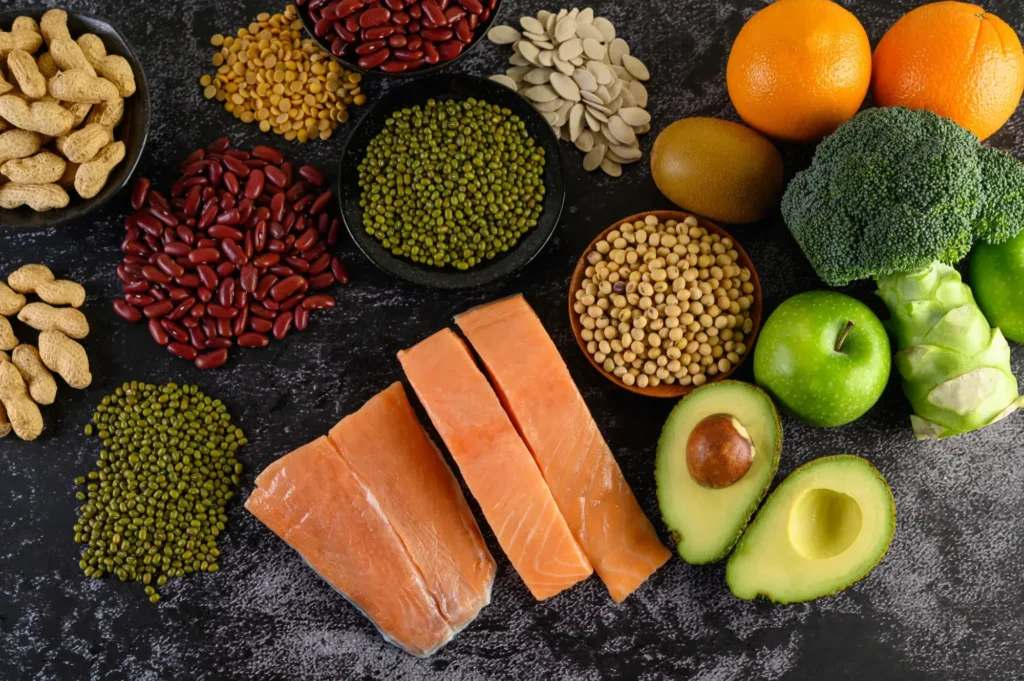Although some individuals may require or opt to avoid certain foods or follow certain diets for health reasons, most individuals do not need to follow to any particular diet to feel their best.
However, it is important to note that certain eating patterns can have positive effects on your overall health. For example, some individuals may find that they feel their best when following a low-carb diet, while others may thrive on high-carb diets. In essence, eating healthily does not necessarily mean following strict diets or specific dietary guidelines. Instead, it involves prioritizing your well-being by consuming nutritious foods that fuel your body. The details of what constitutes healthy eating may vary from person to person based on factors such as location, financial status, cultural and societal influences, and personal taste preferences.
Now that you know why healthy eating is important, let’s check out some tips for nutrition basics.
Nutrition Basics Tips
1. Nutrient-rich choices
When it comes to healthy eating, it’s important to shift the focus from calories to nutrients. Your body needs a variety of nutrients like protein, carbs, fats, vitamins, and minerals to function properly. Not all foods are created equal when it comes to nutrients. Some foods, like candy bars and boxed mac and cheese, may be high in calories but lack essential nutrients. Some foods, like nuts, full-fat yogurt, avocado, and fatty fish, are high in calories but are still packed with nutrients that are good for your health. Remember, the number of calories in a food doesn’t determine how healthy it is. Focus on eating foods that are rich in nutrients like protein, fibre, healthy fats, vitamins, and minerals.
2. Expand your palate
Eating a wide range of foods is important for a healthy diet. It helps your gut bacteria, maintains a healthy weight, and reduces the risk of chronic diseases. However, it can be challenging for picky eaters. To overcome this, try introducing new foods gradually. Start by adding a favourite vegetable to one or two meals a day and expand from there. Remember, the more you try a food, the more likely you are to develop a taste for it.


3. Highly processed foods
One way to upgrade your eating habits is by reducing your intake of highly processed foods.
Processed foods are not all bad. Some nutritious options like shelled nuts, canned beans, and frozen fruits and vegetables have undergone some processing. However, highly processed items such as soda, mass-produced baked goods, candy, sugary cereals, and certain boxed snacks are often lacking in whole food ingredients. These products typically contain unhealthy additives. Studies have shown that diets rich in ultra-processed foods are associated with a higher risk of depression, heart disease, obesity, and various health issues. Consuming a diet low in these foods and high in whole, nutrient-rich foods can help protect against disease, increase lifespan, and enhance overall physical and mental health.
4. Understand the Macronutrients
Macronutrients, which are the main nutrients obtained from food, consist of carbs, fat, and protein. Fibre is also considered a type of carb. It is generally recommended to have a balanced mix of these three nutrients in your meals and snacks. Adding protein and fat to carb-rich sources that are high in fibre can make your dishes more satisfying and delicious. Counting macros and strictly following a macronutrient plan is not necessary for most people, unless you’re an athlete, aiming for a specific body composition, or have medical reasons to gain muscle or fat. In fact, obsessing over counting macros and fixating on staying within a certain macro range can lead to an unhealthy relationship with food and calories, or even contribute to disordered eating tendencies. It’s important to note that some individuals may thrive on diets that are low in carbs and high in fat and protein, or vice versa. However, even on these types of diets, counting macronutrients is typically not necessary.
If you want to improve your eating habits, making some simple changes can help steer you towards a healthier lifestyle. While healthy eating can vary from person to person, a well-rounded diet typically includes plenty of nutrient-packed foods, minimally processed items, and satisfying meals and snacks.
A lot of people struggle with their relationship with food. To cultivate a positive relationship with food, having the necessary resources is key.
At Angelo Anestis Aquatic Centre, we’ve fitness programs that include effective workouts and healthy diet plans that enable you to be the best version of yourself.
Check out our facilities and become a member now!



